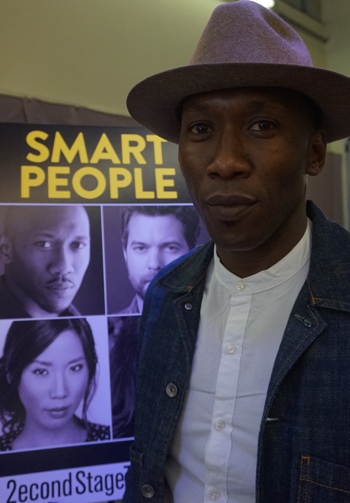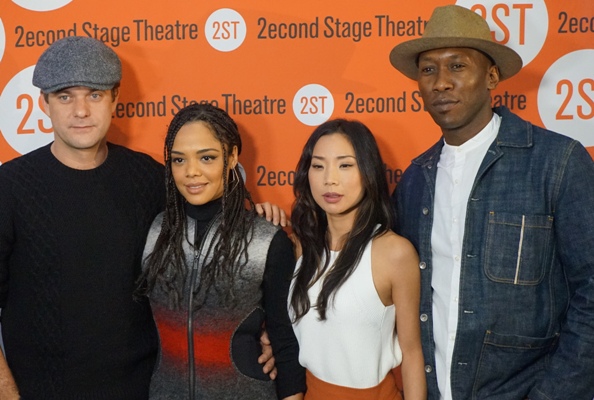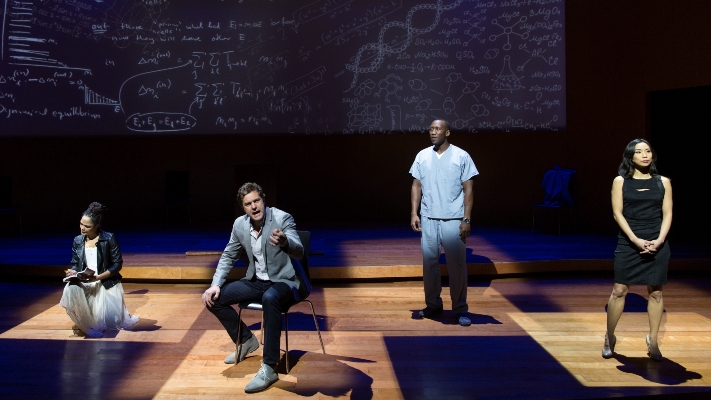When actor Mahershala Ali joined the cast of
noted playwright Lydia R. Diamond’s off-Broadway production Smart
People, he added another feather in his cap. He had just finished
tackling both The Hunger Games: Mockingjay 1 & 2 and House of
Cards. Now with his recent casting as the nefarious Harlem nightclub
owner Cornell “Cottonmouth” Stokes, he’s taken on a role that will
garner him an even bigger geek fan base – the villain in Marvel’s
Netflix series Luke Cage, based on the classic comic book. Not
only that, he has an acclaimed indie film called Moonlight coming
soon.
Born Mahershalalhashbaz Gilmore in Oakland,
California and raised in nearby Hayward, Ali received his Mass
Communications BA degree at St. Mary’s College. He professionally
debuted as an actor with the California Shakespeare Festival in Orinda.
Soon after, he moved cross country and earned a Master’s degree in
acting from New York University’s grad program.
Directed by Kenny Leon, Smart People has
quite a cast – Anne Son, Joshua Jackson, Tessa Thompson and Ali – and
recently they assembled to talk with press before its upcoming limited
run.
In
doing so, Ali offered some quick off-the-cuff remarks on what he has
derived from working on his character in Luke Cage. Said the
tall, 41-year-old actor about his bad guy persona, “He’s so different
from the play’s character. Coupled with that being done on stage, it is
such a different experience from working on [a television series]. I
realized how different a world he came from, and from what I know.
“That guy is such a villain. He’s from such a
different world from this one. I felt like I was able to transform
myself into him – on the day. I successfully transformed myself despite
the fact that he was such a challenging character. That’s all I can say
now. But I was glad to do a character that was so challenging.
 “I don’t really compare any of the characters I
play. I try to go into them being very open to what the characters can
offer, what I can bring to them and then bring a being to life.”
“I don’t really compare any of the characters I
play. I try to go into them being very open to what the characters can
offer, what I can bring to them and then bring a being to life.”
Ali also offered his own thoughts on the lack
of racial diversity stirred by the recent controversy swirling about the
Oscars: “For me it’s not a new conversation, it’s been the
conversation. It’s not new information for me. For others maybe, but
for me – where I might be the only black person on the project – it’s
nothing new.
“It’s about very talented writers, directors,
producers, and actors being in a position for their projects to be
supported but there’s just not enough black projects being made. [That’s
the real problem.] There not enough going into production so that we can
tout them. Look at Precious... In order for them to stand out,
they have to get made in the first place. That’s just not happening
enough.”
After seeing Ali playing his character Jackson
in Diamond’s latest meditation on race and culture – with his huge chip
on shoulder and a seriously abrasive manner – it seemed like some of the
villainous character he plays in Luke Cage rubbed off.
Of course, that’s really a testament to his
skills. In person, he’s a really gracious guy, quick to answer serious
questions with a deliberation and determination – a far cry from either
character. Next on his calendar – he stars in Gary Ross’s civil war era
drama The Free State of Jones. STX Entertainment will release the
film on May 13, 2016.
What follows is his take on the play, its
powerful impact and his career developments.
What
was it like working with such an accomplished director as Kenny Leon?
Kenny’s been really wonderful. He’s so honest
and upfront. He doesn’t pull any punches, but it’s never [negative].
He’s always constructive, but he’s straight up. He definitely expects
you to carry the weight and discover [your character]. He’s a wonderful
collaborator and terrific director. It’s been a joy and wonderful
working with him.
You have
done television and films. How and why did you chose to do this
theatrical production at this time?
I appreciate the challenge. This stands out for
me. The material is so strong and rich. It was impossible to say no to
the opportunity to play this character. It’s been very challenging for
me to voice the concerns of this character.
 We are
thrown back to Obama’s first election. It was such tense time in our
society and yet so exciting as well. What do you remember?
We are
thrown back to Obama’s first election. It was such tense time in our
society and yet so exciting as well. What do you remember?
Exactly that, a mix of emotions. A lot of hope
but it also brought up so many issues that were happening – and still
happening. My grandfather supported Hillary. Funny, in the play it’s
full of so many different perspectives and point of views, so I really
appreciated that time. We haven’t really had a time like that.
What kind
of conversations does your character Jackson having during this time
period?
On a very personal level, Jackson is just
dealing with being viewed as insubordinate. It has more to do with being
a black man in a world where he is very much an outlier. Somewhat
outside of what would be his norm and so therefore is being
misunderstood. Perhaps someone who looks like Jackson, [it’s tough]
biting their tongue, often enough, [to be] fitting in and riding the
wave until they get what they want.
Jackson
isn’t someone [who has it] in him to bite his tongue. He is going to
speak up and so he is quickly viewed as the angry black man. In some
ways he is, but it’s a very complicated time to excel with everything
that he’s done. Now he’s at a point where no matter how great he is, he
has reached a ceiling. A gatekeeper has to let him in if they so choose
to. I think that is what’s frustrating. That is a lot of what Jackson is
dealing with – and he and Brian [Joshua Jackson] talk about that.
What kind
of emotional journey did you take on to do this play?
I’m still very much experiencing it. I’m trying
to learn and ask questions. Dealing with this character everyday – his
history and dealing with society where we are now but also where we were
eight years ago. Jackson is outlier in own community. [He has to exceed]
expectation [and excel] academic ally in studying to be a neurosurgeon.
That makes him an outlier in the Boston medical world [and his own as
well]. With combination those two things, he doesn’t have anyone that he
can necessarily relate to. In that way, it’s challenging being on that
island for that character.
 It actually ends up making Jackson’s
relationship with Joshua’s character that much deeper and more
important. In some ways because of Brian’s own trajectory, they can
relate to [each other] in a way. In their own homes and own areas where
they’re from, other people can’t relate to them.
It actually ends up making Jackson’s
relationship with Joshua’s character that much deeper and more
important. In some ways because of Brian’s own trajectory, they can
relate to [each other] in a way. In their own homes and own areas where
they’re from, other people can’t relate to them.
He studying to be surgeon. He is in his
residency right now. He intended to be a brain surgeon. He’s having a
bit of trouble with that because of race, politics, and the dynamic of
that world. And him being a black man in Boston so he’s seen it through
a black person’s minds. Of his relationship with Joshua’s character –
Brian, who is also somewhat of an older guy but also a black sheep in
his family – the two of them come together. They have an extraordinary
friendship because they’re both sort of oddities.
Do you
think the premise of the show is now more relevant than the time when it
was set?
It’s relevant in part because it would take
several more years or decades to be able to have this conversation about
race that is honest – so in that way it is even more relevant. You can
tear off all those layers and you’re back towards the center of talking
about it, as opposed to having to be very conscious. Not knowing if it’s
okay to talk about it in the world we are living in as real human
beings.
In this
world that [Lydia] has made, the conversations that they have cut to the
chase. In that way, you get to hear things within its two hour and 45
minute mark stuff that cuts to the heart of [things that going on right
now]. And it makes us all think about where we have [to be on these
issues – success, race, authenticity...]
[The two hour plus live production began previews on
January 26, 2016 at Second Stage Theatre’s Tony Kiser Theatre. Opening
night is set for February 11 and runs until March 6th.]
Email us Let us know what you
think.